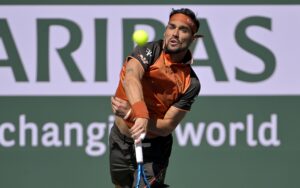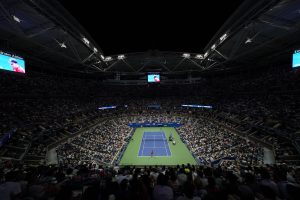2018 ended superbly for Russia’s Karen Khachanov as he stormed to victory in Bercy, defeating world #1 Novak Djokovic in the final to lift his first Masters 1000 title. It was a win that took him to a career-high ranking of 11th in the world, but more importantly it established his credentials as one of the future stars of the game. But unfortunately for Khachanov, who is seeded second in Rotterdam this week, that is becoming an increasingly crowded field.
Greece’s Stefanos Tsitsipas, who will be competing alongside Khachanov in Rotterdam, arrives in Holland fresh from reaching the Australian Open semifinals, beating Federer along the way. Daniil Medvedev, Khachanov’s countryman and the fifth seed in Rotterdam, lacks a similar standout result, but he has won four titles in the last 13 months and reached the second week at a grand slam for the first time in Melbourne. Croatia’s Borna Coric also made a strong start to the season, although he is currently battling a leg injury.
Khachanov, in contrast, has yet to find his feet in 2019. He has won just two of his five matches on tour so far this season, losing first-time out in Qatar and Sofia as well as being bundled out of the Australian Open in the third round in straight sets by Roberto Bautista Agut. He has struggled to impose himself on opponents in the manner of late 2018. In Sofia, for example, he was simply out hit by Italy’s Matteo Berrettini in a 7-6 3-6 4-6 loss.
It is, of course, far too early for the Russian to panic. The season is not yet two months old and Khachanov has relatively few points to defend between here and the grass court season. But there are still reasons to be concerned. Khachanov’s win in Paris raised expectations around the 22-year-old significantly and he is yet to look comfortable with the increased scrutiny. But if he wishes to continue to rise up the rankings, the intensity of the pressure will also continue to ratchet up.
That is a problem that Alexander Zverev, already a three-time champion at masters-level but yet to make an impact at the slams, has not yet managed to solve. The result is that Zverev finds his career stalling, with each step forward, such as his demolition of Djokovic to win the ATP Finals in London, matched by a step backward, such as his collapse against Milos Raonic to lose 1-6 1-6 6-7 in the fourth round at Melbourne Park.
Khachanov will surely hope to avoid a similar outcome by maintaining his forward momentum. He has the chance to do just that in Rotterdam. The decision of 2018 champion Roger Federer not to defend his title alongside a host of withdrawals, has left the draw weaker than usual. Top seed Kei Nishikori is the only top ten player to have made the trip. The sole major champion amongst the 32 is Stan Wawrinka, now ranked outside the top 50 after battling with injuries for much of the past two years.
Khachanov himself opens his campaign with a winnable match against Dutch wildcard Tallon Griekspoor, ranked 200 places below him the world rankings and with just one tour-level win to his name. Jo-Wilfried Tsonga, a potential second-round opponent, could provide a test, but the Frenchman’s energy levels are surely depleted after his run to the title in Montpellier. The majority of the other big names are located in the other half of the draw.
There can be no doubt then, that Khachanov has a real opportunity to put together a deep run in Rotterdam. His reward for doing so is a likely to be a place in the top ten, which would mark a significant milestone for the 22-year-old. That would make him the second youngest player amongst that elite number behind Zverev and, crucially, see him maintain his forward momentum. The chance is there for Khachanov. The question now is whether he can he take it?
Main photo:
Embed from Getty Images





